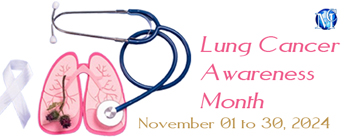Journal of
eISSN: 2376-0060


Proceeding Volume 3 Issue 1
1Editor-in-Chief, Journal of Lung, Pulmonary and Respiratory Research, USA
210th
35th
4Department of Pathology, Faculty of Medicine, Chiang Mai University, Chiang Mai, Thailand
Correspondence: Attapon Cheepsattayakorn, 10th Zonal Tuberculosis and Chest Disease Center, 143 Sridornchai Road Changklan Muang Chiang Mai 50100 Thailand, Tel 66 53 140767, Fax 66 53 140773
Received: February 14, 2016 | Published: March 2, 2016
Citation: Cheepsattayakorn A, Cheepsattayakorn R. New drugs in lung cancer chemotherapy. J Lung Pulm Respir Res. 2016;3(1):29. DOI: 10.15406/jlprr.2016.03.00072
The new chemotherapeutic agents offer equally or more effective palliation, with more favorable therapeutic index and reduced toxicity. Despite advances performed in detecting and treating lung cancer, its prognosis remains grim. Having only 50% chance of five-year survival even patients whose lung cancer are caught at their earliest stage. Uniquely targeted therapies with specific inhibitor drugs such as crizotinib is due to the discovery of a number of lung cancer-molecular alterations. Crizotinib, the first inhibitor of both C-Mesenchymal-Epidermal-Epithelial-Transition receptor kinase and anaplastic lymphoma kinase has been approved for the treatment of anaplastic-lymphoma-kinase-positive non-small-cell-lung cancer in the United States. TOR (Target of Rapamycin) kinase inhibitor plus erlotinib or a cytidine analog for treatment of non-small-cell lung cancer was recently introduced. Treatment with EGFR (Epidermal Growth Factor Receptor)-TKIs (Tyrosine Kinase Inhibitors) (gefitinib, erlotinib) is currently recommended for the first-line treatment regimen of advanced non-small-cell lung cancer. Better median survival of gemcitabine plus cisplatin, vindesine plus cisplatin, gemcitabine plus carboplatin, and mitomycin plus vinblastine plus cisplatin regimens as the second-line drugs was demonstrated in treating advanced-stage non-small-cell lung cancer in comparison to a single agent chemotherapy with docetaxel. Currently, erlotinib, pemetrexed, and docetaxel are the only approved chemotherapeutic agents for second-line chemotherapy in unselected patients with non-small-cell lung cancer. In 2013, many compounds, such as nitrobenzamide, benzodiazepine, cyclopropane, taxane, purine, pyrrolopyrimidine, arylamino purine, and quinazoline were introduced in treating non-small-cell lung cancer. A piperidine and piperazine derivative as Sobitan-Mono-Oleate antagonists for treating small-cell lung cancer was recently introduced as well as picoplatin and arsenic trioxide. Other more innovative strategies may further broaden our ability to effectively treat these patients and expand our current ability to control this disease, palliative symptoms, prolong survival, and improve overall quality of life. This poor prognosis is due to in part to the cancer’s ability to resist chemotherapy. Finally, a number of questions remain to be answered, such as: are combinations a regimen superior to single-agent chemotherapy, are three drug combination (or four) better than two and does dose intensity have a role in advanced non-small-cell lung cancer, etc.
None.
The author declares no conflict of interest.

©2016 Cheepsattayakorn, et al. This is an open access article distributed under the terms of the, which permits unrestricted use, distribution, and build upon your work non-commercially.
 November is Lung Cancer Awareness Month, a vital opportunity for us to raise awareness about the dangers of lung cancer. Let’s unite to educate ourselves and others, and inspire proactive steps toward lung health. This year the motto of this event is “Stronger Together: United for Lung Cancer Awareness”. So for this occasion, the Journal of Lung, Pulmonary & Respiratory Research invites articles that emphasize the significance of lung protection. All the submissions received in the month of November will be offered with 40% discount on publication.
November is Lung Cancer Awareness Month, a vital opportunity for us to raise awareness about the dangers of lung cancer. Let’s unite to educate ourselves and others, and inspire proactive steps toward lung health. This year the motto of this event is “Stronger Together: United for Lung Cancer Awareness”. So for this occasion, the Journal of Lung, Pulmonary & Respiratory Research invites articles that emphasize the significance of lung protection. All the submissions received in the month of November will be offered with 40% discount on publication.